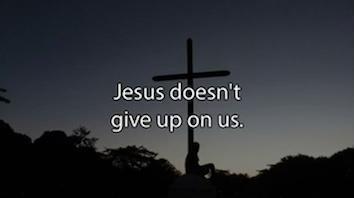Now we have to shape what some have started calling; The Church at Home. Although I keep asking myself; What do those who do not have a home do? For this reason, at the same time, I am declaring today in our Holyrood Church a Lenten day of prayer, fasting and reading the Bible in the Time of the Coronavirus.
Jesus is not willing to give up on you or me

Good morning, happy Friday, and many blessings.
The story of todays’ Gospel (Mateo (21:33-43.45-46) is neither Jesus’ first nor his last confrontation with the Pharisees. We tend to avoid those with whom we have conflict and confrontation. But not Jesus. He just keeps on coming. At every turn he is offending, aggravating, and confronting the Pharisees. He eats with the wrong people. He won’t answer their questions. He taunts them by breaking the law and healing on the Sabbath. He calls them hypocrites and blind leaders. He escapes their traps. He leaves them speechless. He rattles off a string of “woes” against them. He compares them to a disobedient son who will not work in the vineyard. They just can’t catch a break with Jesus. He never lets up.
So what’s that all about? Why can’t he just let go of them? And what does that have to do with us? Is Jesus looking for a fight? I don’t think so. Is his primary motivation to expose and condemn those who do not follow him? I don’t think so. Is he keeping score and naming all the attitudes and behaviors of the Pharisees that he considers wrong? I don’t think so. Is Jesus trying to exclude from the kingdom of God the religious leaders of his day? I don’t think so.
Here’s what I think these confrontations are about. Jesus is unwilling to give up on the Pharisees, or anyone else for that matter. Jesus is unwilling to give up on you or me. He just keeps on coming. That is the good news, hope, and joy in today’s parable. This is not so much a parable of exclusion or condemnation as it is a parable of Jesus’ unwillingness to give up. His unwillingness to give up on us often confronts us with truth about our lives that is almost always difficult to hear and accept. We might hear his words, but do we realize he is taking about us?
This parable and the confrontation this parable provoke are like a mirror held before us so that we might see and recognize in ourselves what Jesus sees and recognizes. This is not to condemn us but to recover us from the places of our self-exclusion, to call us back to life, and to lead us home.
Jesus doesn’t exclude us or anyone else from the kingdom of God. He doesn’t have to. We do it to ourselves and we’re pretty good at it. That’s what the Pharisees have done. The Pharisees have excluded themselves.
We’ve all been given vineyards. They are the people, relationships, circumstances, and events of our lives that God has entrusted to our care. That means our spouse and marriage, children and family, our work, our church, our daily decisions and choices, our hopes, dreams, and concerns are the vineyards in which we are to reveal the presence and life of God, to produce the fruits of the kingdom. The vineyards, our work in those vineyards, and the fruit produced come together to show us to be sharers in God’s kingdom; or not.
Jesus came unto his own and his own did not receive him. What did Jesus do in response to his being rejected by the people? As you read the story what thoughts and feelings stir in you. What is this story trying to tell you about the God of Jesus?
Blessings,
Fr. Luis+
- Log in to post comments
